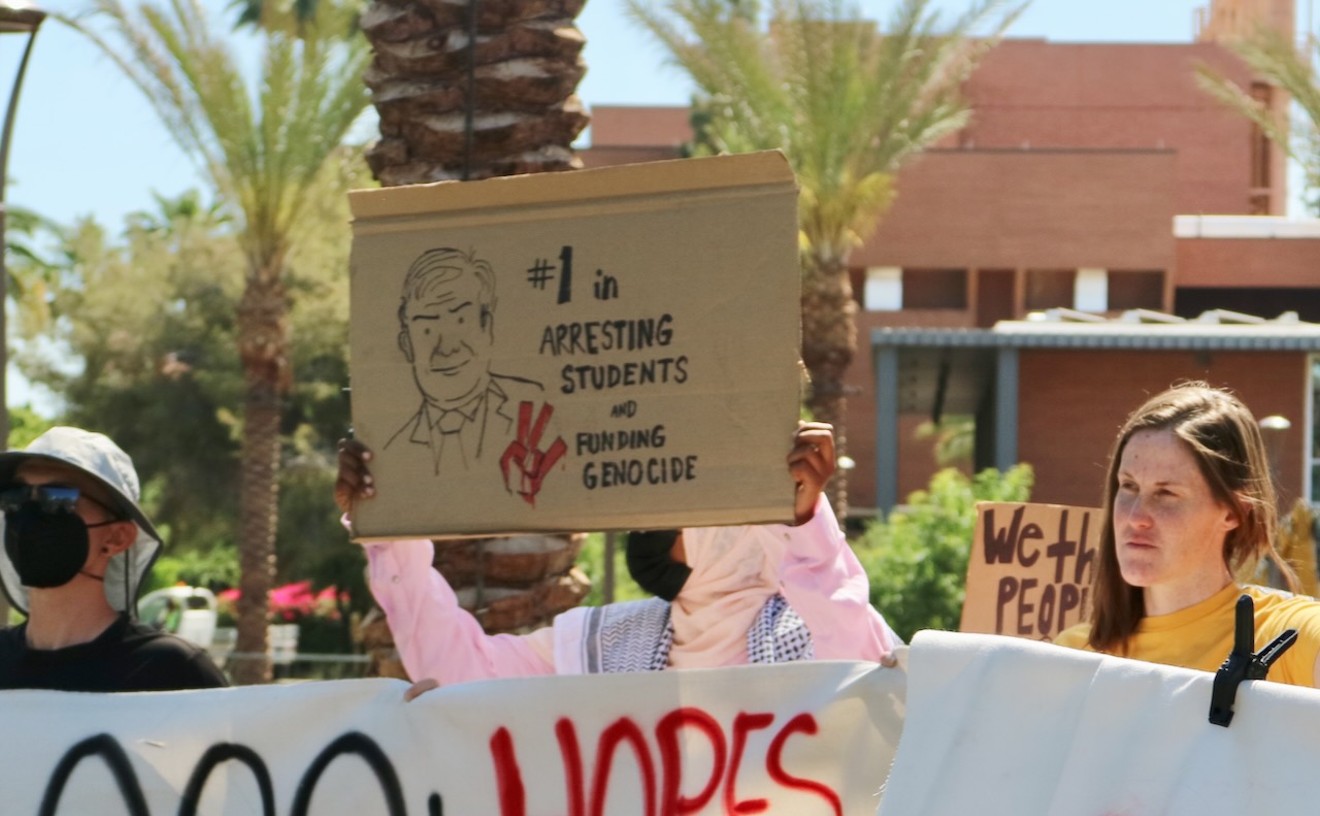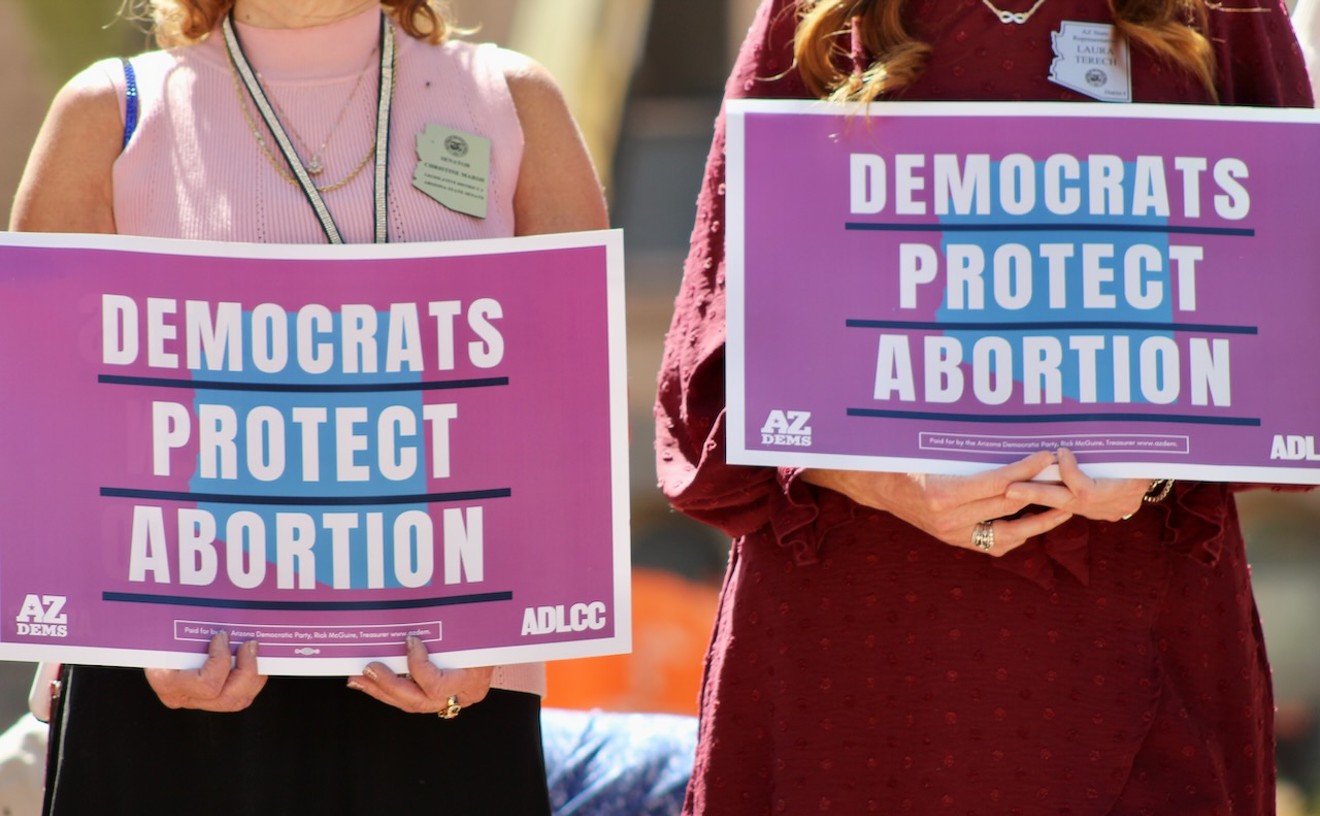"Macehualli means 'those who deserve honor for their work,'" the 56-year-old informs me. "It's Nahuatl, the language of the Aztecs. It's from a time and place when work was prestigious, and honored."
He looks around at those sitting at picnic tables under tarps, standing out in the still-pale sun, or checking on the gated blue shrine of the Virgin of Guadalupe, which sits at the heart of Macehualli.
"These guys here, they maintain the lawns and the landscaping," he says, speaking not only of those present, but those who congregate in greater numbers during the week. "They built City Hall, and most of the developments in the area. Yet they are persecuted, berated. You've seen how we're treated at demonstrations."
Indeed, I have. Many times, I've been down to observe the clashes at M.D. Pruitt's Home Furnishings, near 35th Street and Thomas. Reza and his supporters have been boycotting Pruitt's, protesting store owner Roger Sensing's decision to have Sheriff Joe Arpaio's deputies on his property and in the area. Arpaio's officers have arrested scores of alleged illegals, some jornaleros, some who just happen to have been driving while brown.
But I'm not looking to rehash the persistent ugliness at Pruitt's. Like when Roger Sensing had manure spread on the sidewalk in front of his store, and asked Reza, sarcastically, if he could find workers to help Sensing plant flowers in the dung. Or the time a nativist referred to dancing Mexican-American children as "monkeys."
Rather, I'm interested in how Arizona's new employer-sanctions law will affect the men and women Reza serves, who donate a dollar toward the Macehualli camp's upkeep for each job they snag from employers who drive into Macehualli's parking lot seeking laborers.
Much has been written about how Arizona's business community is praying itself to sleep at night, hoping a federal judge issues a temporary restraining order and stops the legislation from inflicting a mortal blow to the state's still-enviable economy. The Wall Street Journal recently gave these nightmares front-page treatment, quoting University of Arizona immigration expert Judith Gans as stating, "Getting rid of [undocumented] workers means that we are deciding as a matter of policy to shrink the economy."
Ask Arizona Chamber of Commerce President and CEO Glenn Hamer, former executive director of the state Republican Party, and he'll tell you it's not a matter of whether the state's economy is about to sustain a self-inflicted wound, but whether the limb will be sliced off at the kneecap or higher.
"It's a question of degree, the effect this law will have on the state's prosperity," Hamer tells New Times. "Of the almost 100 years Arizona's been in existence, if you had to describe in one word the master state plan, it would be 'growth.' This new policy is a contractionary policy. The sponsors of the bill even say it will 'downsize' Arizona."
(Confronted with these assertions, supporters of the law point to savings in government services they allege illegal aliens are draining, and many of Hamer's fellow Republicans in the Legislature are salivating at the prospect of cutting government programs as the state's budget woes increase.)
With such dire, Cassandra-like predictions, it's no surprise that an impressive coalition of business associations is challenging this two-strikes-and-you're-out hiring statute, set to go into effect January 1. These include, in addition to the state Chamber of Commerce, the Arizona Contractors Association, the AZ Hispanic Chamber of Commerce, and the Arizona Landscape Contractors Association. Currently, these groups are in federal district court, suing to stop the law before it's implemented.
Otherwise, HB2779, the Legal Arizona Workers Act, signed into law by Governor Janet Napolitano in July, will force them to utilize the federal government's E-verify system, to check the work authorization of new hires. If an employer is found to have knowingly or intentionally employed an illegal alien, the first "strike" earns the employer a 10-day suspension of his business license. The second violation during a three- to five-year probationary period garners a "business death penalty," as some have called it — permanent revocation of all licenses necessary to operate a business in Arizona legally.
The catch is the word "legally." Reza believes an underground, prohibition-like economy will flourish afterward, with more and more workers getting paid cash under the table, assuming they remain in Arizona.
"People like Russell Pearce [sponsor of the sanctions statute in the Legislature], they're taking work to the level of criminality, which is affecting both the employers and the consumers," he observes. "It's really sad. You criminalize a whole section of people that's making the economy move."
The biggest losers, Reza insists, will be county, city, and state tax coffers. An unscrupulous or desperate employer will show records for, say, five employees but will actually have 15 — meaning 10 people won't have any taxes withheld. Corporations will avoid setting up shop in Arizona to avoid the hassle and expense of setting up a business, only to lose it under HB2779's "death penalty." Some here, if they can afford to, will move and take the best workers with them.
You don't have to be Alan Greenspan to realize the impact of such economic bleeding on the budgets of local governments, which are already dealing with shortfalls due to a sluggish housing market.
Mostly from fear, Reza says employers are laying off Hispanic workers, but he believes they will eventually be rehired out of necessity, and likely under the table. The workers who utilize Macehualli are already part of the cash economy. Reza asserts they do not fall under the purview of the new legislation.
"Federal law says you don't have to ask for papers when you ask somebody to cut your lawn," says Reza. "If you hire someone for 72 hours, then you have to fulfill IRS requirements. If you have an independent contractor and pay him more than $600, you have to report that to the IRS."
Jornaleros, you see, might work from a few hours to a day or two at a time, getting paid anywhere from $8 to $12 an hour. Still, many of the ones I spoke to at Macehualli say they will move out of state and know people who've already done so.
One big, jovial guy, whom I'll call Vinnie to protect his identity, tells me he will move to New Mexico next year because "it's going to get harder to get work for all the people." Vinnie came to America on a six-month tourist visa and has been here two years. He says he'll do "any kind of work, man." The facts that his skin is pale, he has reddish hair, and he speaks fair English don't hurt him in this regard.
"Tell him who you worked next to at the gun show," laughs Reza.
"The Minutemen!" Vinnie says, describing how he was helping man a booth next to the vigilante group's. "They thought I was an American guy because of my color."
Sounds like they tried to recruit him. Vinnie says they even gave him a Minuteman hat. Too bad they didn't inquire as to Vinnie's thoughts on Sheriff Joe and his deputies.
"Can I use bad words?" he asks.
A sweet lady with large brown eyes, Dolores relates in broken English that she has been living illegally in the United States for six years, and that she does mostly housecleaning and babysitting. She has three children of her own. The oldest is a star lineman on a local high-school football team. Next year, he'll be a senior.
Is she afraid for her children, for her son especially? Her eyes widen and she tells me yes. She doesn't have to say why. Soon her son will be driving. And if he's pulled over for a minor infraction and found to possess a fake ID, the resulting Class 4 felony could have him in Sheriff Joe's jails. There, he would be under pressure from ICE agents to sign voluntary paperwork for what essentially is deportation back to Mexico, away from his family and his home.
Already such cases are commonplace. I'm reminded of that kids' flick Chitty-Chitty Bang-Bang, where all the children of the kingdom of Vulgaria are imprisoned or hidden away in sewers, to keep them from the clutches of a black-clad Child-Catcher. There's more than a touch of evil about our own Vulgarian state, where teenagers are hauled in for removal by Sheriff Joe.
Dolores' husband is a welder. The contracting firm for which he works moved to Utah in September, in part because of the advancing January 1 deadline. He spends three weeks there, and comes home for one week with his family. Will she move her family to Utah to be with him?
"Maybe, or maybe to some other state," she says, meekly. "Arizona is no good for us."
I converse with a guy I'll call Joe, who says he intends to stay and insists he's afraid of nothing. Many of his friends, however, are returning to Mexico.
While I'm chatting with him, an Anglo in a sleek, new-ish truck pulls up and both Joe and Dolores grab their tools and get ready to hop in.
"They're good workers," he admits. "I've gotten to know [Joe] and he's just trying to make a living. On the other hand, I know he's not paying taxes. So I'm kinda on both sides, right there. I don't agree with these big businesses hiring these people, making millions off them. But for me, when I need somebody to help me with help around my house, it's great."
He says there should be some way for Joe and Dolores to stay in the country legally if they can pass a criminal background check. That makes him a relative moderate in Arizona.
Reza overheard the conversation and related a similar case of Caucasian self-contradiction that occurred when he was testifying before the Legislature in 2005. He was arguing against a statewide prohibition on any funding of day-laborer sites by municipalities. Reza told me how a neighborhood activist nearly assaulted him when he informed legislators that he had once helped procure day laborers for the man.
"I told [the legislators] there are a lot of hypocrites in here," he recalls, referring to those testifying for the prohibition. "This guy [who got ticked off] had asked me to find workers for him to pick up oranges in the Arcadia area, because the rats were eating the oranges. The people in the community were too old to pick up the fruit. He said he never did that, but I had brought him two or three workers myself."
The anecdote points out one of the ironies of the immigration debate. Often those who seem most opposed to the influx of illegal aliens are those most in need of their labor — the elderly. The ranks of the counterprotesters at the Pruitt's donnybrook are beefed up with older people who long for the '50s. A time and place when all you saw were white people, or so it seems to them, because the society was then so highly segregated.
Irony aside, it's unlikely local alter kockers will be straining their backs to pick their own fruit. As Reza points out, the law will not apply to people picking up jornaleros for a little part-time landscaping. It will be larger employers who want to follow the law who feel the squeeze, as will we all.
Though Arizona is home to an estimated 500,000 illegals, and while the workers from this pool make up anywhere from 9 to 12 percent of the state's work force, Arizona has an incredibly tight labor market, with an unemployment rate of 3.5 percent. (Five percent is generally deemed to be "full employment" by economists.) Such a labor shortage, further exacerbated by the new employer-sanctions law, will be felt in higher prices for essential goods and services, as above-board employers pass on increased labor costs to consumers.
More alarming, however, than paying more for your hamburger is the prospect that the new law will be enforced here by County Attorney Andrew Thomas and Sheriff Arpaio.
From what we've seen in the past, expect INS-style raids staged for TV cameras, with Joe wagging his finger at supposed lawbreakers. Thomas has recently stated that he believes the law can be enforced retroactively, which should be cold comfort to employers racing to comply with it by January 1. Even if you do everything by the book in 2008, Thomas and Arpaio could still come get you, perhaps based on an anonymous tip from one of your competitors.
"To begin with, they don't have the personnel to enforce this law," alleges Reza. "So what that tells me is Arpaio's going to go after certain businesses to make a political statement. The Sheriff's Office is going to be very selective. Like it is with newspapers."
Selective. You know, as in Arpaio's Selective Enforcement Unit, whose officers arrested New Times co-founders Michael Lacey and Jim Larkin. Indeed, Arpaio's passion for retaliation was most recently documented by my colleague Sarah Fenske in the first installment of the "Target Practice" series ("Enemies List," November 29).
The new law will give Arpaio another way to coerce and control the county's rich and powerful, who might own some of the enterprises he and Thomas go gunning for. Like, say, Carl's Jr. franchise king Jason LeVecke, who's been outspoken in opposing the law. A slip-up in hiring at any one of his 57 locations could put him out of business.
"It's not just about whether someone's legal or not," LeVecke tells me. "It's about whether my whole business goes under and 1,200 people lose their jobs."
Incredibly, nativists are willing to shrink the economy, force illegals to "self-deport," and make businesses kowtow to reactionary demands, perhaps even kiss Arpaio's ring for good measure. The question is, how bad will the situation have to get before politicians stop listening to this small, vicious band of extremists driving the debate?
"I'm not sure how much pain it will take before the law is changed," shrugs the Arizona Chamber of Commerce's Hamer.
In Reza's view, the law's failure is inevitable, and not just because some judge may put the brakes on it through a temporary restraining order.
"You're messing with the natural flow of commerce," he observes. "And you're creating artificial barriers. Commerce and the market are like a human energy. You can't stop it. A lot of companies will refuse to comply with this law. [Of the companies that don't comply] those that survive will survive underground."











